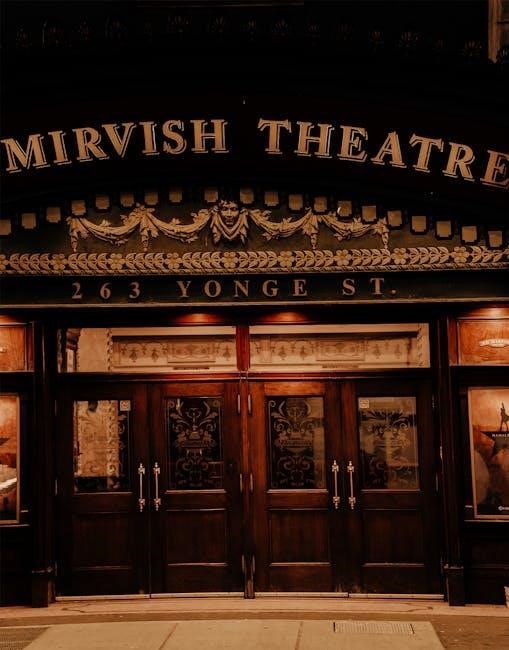“Mein Herr Marquis” is a celebrated aria from Johann Strauss II’s operetta Die Fledermaus. It showcases Adele’s wit and charm‚ highlighting her cunning and vivacity. The piece is renowned for its lyrical complexity and comedic brilliance‚ making it a cornerstone of musical theater repertoire. Its enduring popularity stems from its masterful composition and universal appeal to both classical and general audiences.
Overview of the Song
“Mein Herr Marquis” is a captivating aria from Johann Strauss II’s operetta Die Fledermaus‚ sung by Adele‚ a clever and charming lady’s maid. The song showcases her wit and cunning as she navigates a complex web of identities and deceptions. With its lively rhythm and playful lyrics‚ the aria highlights Adele’s vivacity and determination to outsmart those around her. The piece is structured as a polka‚ featuring intricate coloratura and comedic timing‚ making it a standout moment in the operetta. Its popularity endures due to its musical brilliance and the universal appeal of Adele’s relatable yet mischievous character. The song is often celebrated for its technical challenges and theatrical flair‚ cementing its place in classical music repertoire.
Historical Context of the Operetta
Die Fledermaus‚ the operetta in which “Mein Herr Marquis” is featured‚ premiered in 1874 in Vienna‚ Austria. Composed by Johann Strauss II‚ it reflects the vibrant cultural and social life of 19th-century Vienna. The operetta is set against the backdrop of a grand ball‚ exploring themes of love‚ deception‚ and social class. Its libretto‚ written by Carl Haffner and Richard Genée‚ draws inspiration from earlier French plays‚ blending wit and satire. The operetta captures the spirit of the era‚ with its lighthearted humor and critique of aristocratic excess. It became a landmark work in the golden age of Viennese operetta‚ showcasing Strauss’s mastery of melody and orchestration. The historical context highlights the social transformations and political undercurrents of the time‚ mirrored in its playful yet insightful narrative.
Significance in Musical Theater
“Mein Herr Marquis” holds a pivotal place in musical theater history‚ exemplifying the operetta genre’s blend of comedy‚ music‚ and drama. Its intricate composition and dynamic vocals have set a benchmark for soprano performances. The aria’s ability to convey both humor and emotional depth has influenced countless works‚ making it a cornerstone of classical and modern theater. Its enduring popularity underscores its universal appeal‚ transcending cultural and temporal boundaries. As a showcase of Johann Strauss II’s genius‚ it remains a staple in operatic repertoire‚ continuing to inspire new generations of composers and performers. The aria’s significance lies in its masterful balance of artistry and entertainment‚ cementing its legacy in musical theater.
Background of the Operetta “Die Fledermaus”
Die Fledermaus‚ composed by Johann Strauss II‚ is a Viennese operetta premiered in 1874. It blends comedy‚ love‚ and deception with satirical insights into high society‚ becoming a timeless musical masterpiece.
Johann Strauss II and His Contributions
Johann Strauss II was a pivotal figure in Viennese operetta‚ renowned for his captivating compositions that blended wit‚ romance‚ and satire. His work‚ including Die Fledermaus‚ showcased his mastery of melody and orchestration; Strauss’s contributions to musical theater are immeasurable‚ as he elevated operetta to an art form‚ blending light-hearted humor with sophisticated musicality. His compositions‚ such as “Mein Herr Marquis‚” demonstrate his ability to craft memorable‚ vivacious characters through music. Strauss’s legacy endures‚ influencing generations of composers and remaining a cornerstone of classical repertoire. His innovative approach to operetta continues to inspire modern adaptations and performances worldwide.
Plot Summary of “Die Fledermaus”
Die Fledermaus revolves around Gabriel Eisenstein‚ who avoids prison by attending a lavish masked ball hosted by Prince Orlofsky. Disguises and mistaken identities abound as Eisenstein’s wife‚ Rosalinde‚ seeks revenge for his infidelity. Adele‚ Rosalinde’s maid‚ borrows her mistress’s clothes to attend the ball‚ where she captivates Eisenstein with her charm and wit. The operetta unfolds with comedic twists‚ showcasing themes of love‚ deception‚ and social class. Its lighthearted humor and intricate plot make it a timeless classic in musical theater‚ blending satire with musical brilliance. The story concludes with forgiveness and reconciliation‚ leaving audiences enchanted by its whimsical tale of misunderstandings and redemption.

Cultural Impact of the Operetta
Die Fledermaus has left an indelible mark on musical theater‚ blending wit‚ satire‚ and melodic brilliance. Its themes of love‚ deception‚ and social class resonate universally‚ making it a beloved classic. The operetta’s lighthearted humor and relatable characters have influenced countless adaptations and interpretations. Its music‚ particularly “Mein Herr Marquis‚” has become iconic‚ showcasing Johann Strauss II’s mastery of operetta. The work’s enduring appeal lies in its ability to critique societal norms while entertaining audiences‚ solidifying its place in cultural history. Its influence extends beyond opera‚ inspiring films‚ stage productions‚ and modern interpretations‚ ensuring its relevance for future generations. The operetta remains a testament to the power of music and theater to reflect and shape cultural identity.

Musical Elements of “Mein Herr Marquis”
“Mein Herr Marquis” features a playful‚ soprano-friendly melody with intricate rhythms and comedic timing. Its orchestration‚ rich with woodwinds and strings‚ enhances the aria’s lively‚ mischievous charm‚ creating an unforgettable musical experience.
Composition and Structure
“Mein Herr Marquis” is a soprano aria from Johann Strauss II’s operetta Die Fledermaus‚ written in the key of A-flat major. Its structure follows a lively Allegretto tempo‚ showcasing a playful and mischievous tone. The aria consists of a brief orchestral introduction‚ followed by a main theme that highlights Adele’s cunning and wit. The composition incorporates intricate coloratura passages‚ emphasizing vocal agility and comedic timing. Strauss’s use of modulation and rhythmic shifts adds depth‚ transitioning seamlessly between lyrical and dramatic moments. The piece concludes with a dazzling coda‚ featuring a modulation to E-flat major‚ underscoring Adele’s cleverness and ambition. This structure not only reflects Adele’s character but also exemplifies Strauss’s mastery of operetta composition.

Lyrics and Their Significance
The lyrics of “Mein Herr Marquis” are a masterful blend of wit‚ charm‚ and social commentary. Sung by Adele‚ they reveal her cunning and ambition‚ as she navigates a complex web of relationships and deception. The text highlights her cleverness in manipulating those around her‚ particularly Herr Marquis‚ while showcasing her desire to rise above her station. The lyrics are rich in wordplay and satire‚ reflecting the operetta’s themes of love‚ class‚ and identity. Adele’s lines are both humorous and poignant‚ offering insight into her character’s depth and motivation. The song’s verbal dexterity and emotional resonance make it a standout piece in the operetta‚ underscoring its enduring appeal and cultural significance.
Musical Themes and Motifs
“Mein Herr Marquis” features lively‚ playful melodies that reflect Adele’s wit and charm. The aria is structured in a clear operatic form‚ with a sprightly allegretto tempo that underscores its comedic nature. Strauss’s composition emphasizes rhythmic precision and vocal agility‚ showcasing Adele’s cunning and vivacity. The melody is adorned with ornamental flourishes‚ highlighting the character’s sophistication and ambition. Musical motifs‚ such as the ascending scales and staccato phrases‚ symbolize Adele’s clever manipulation of those around her. The orchestration‚ with its bright‚ effervescent textures‚ enhances the song’s humor and lightheartedness. These musical elements blend seamlessly to create a piece that is both entertaining and musically rewarding‚ embodying the essence of Strauss’s operetta style.

Performance and Interpretation
Notable performances of “Mein Herr Marquis” highlight Adele’s wit and charm‚ with vocal techniques emphasizing precision and agility. Stage directions often feature elaborate costumes and comedic timing‚ enhancing the aria’s humor and character interpretation.
Notable Performances and Recordings
“Mein Herr Marquis” has been performed by renowned sopranos worldwide‚ with standout interpretations by Adele Leigh and Anneliese Rothenberger. Their recordings showcase the aria’s vocal and comedic demands. Modern artists like Hilde Gueden and Joan Sutherland have also left lasting impressions‚ blending precision with charm. The aria’s popularity endures‚ with digital recordings and live performances readily available. These interpretations highlight the versatility of Adele’s character‚ from playful deception to witty dialogue. Critics praise the balance of vocal technique and dramatic flair in these performances‚ making them timeless classics in operetta repertoire. Fans of “Die Fledermaus” continue to celebrate these iconic renditions‚ ensuring the aria’s legacy in musical theater.

Stage Directions and Costumes
In performances of “Mein Herr Marquis‚” Adele’s costume often reflects her transformation from a lady’s maid to a high-society attendee. The stage is typically set with opulent ballroom decor‚ emphasizing the grandeur of the setting. Adele’s movements are choreographed to showcase her wit and charm‚ often incorporating playful gestures and interactions with Eisenstein. Her elaborate dress and accessories highlight her attempt to blend in with the aristocracy‚ contrasting with her usual attire. The stage directions emphasize her vivacity and cunning‚ while the costumes enhance the comedic and dramatic elements of the aria‚ making it a visually engaging and memorable performance.
Vocal Techniques and Challenges
The aria “Mein Herr Marquis” demands precise vocal techniques‚ including agile coloratura passages and strong comedic timing. Singers must master quick articulation and dynamic control‚ balancing humor with lyrical grace. The piece challenges vocalists to maintain clarity during rapid arpeggios while conveying Adele’s wit and charm. Breath control is crucial‚ as the aria’s crescendos and decrescendos require seamless transitions. Performers must also navigate the comedic elements without sacrificing vocal precision‚ making it a technically and artistically demanding piece. These challenges highlight the aria’s reputation as a showcase for soprano virtuosity‚ blending musical brilliance with theatrical flair.
Cultural and Historical Significance
“Mein Herr Marquis” reflects the social dynamics of 19th-century Vienna‚ blending humor with societal critique. Its enduring appeal lies in its timeless themes of deception and class identity‚ resonating across generations in musical theater history.
Influence on Later Musical Works
“Mein Herr Marquis” from Die Fledermaus has significantly influenced later musical compositions‚ inspiring composers like Franz Lehár and Emmerich Kálmán in the operetta genre. Its blending of vocal technique with storytelling set a benchmark for musical theater‚ shaping the development of operettas. The aria’s exposure through numerous performances worldwide familiarized audiences with its style‚ prompting composers to emulate its elements. Additionally‚ “Mein Herr Marquis” played a role in evolving the operetta genre during the 19th century. Its enduring popularity is evident in modern adaptations and references in contemporary music and theater‚ showcasing its lasting impact on musical heritage.
Representation in Popular Culture
“Mein Herr Marquis” has made appearances in various films‚ television shows‚ and commercials‚ introducing the aria to a broader audience. Its recognizable melody and humorous lyrics have been featured in cultural parodies‚ ensuring its relevance across generations. The aria’s inclusion in movies like The Great Waltz and its use in animated series have further cemented its place in popular culture. Additionally‚ “Mein Herr Marquis” has been referenced in literature and stage productions‚ showcasing its versatility. Its widespread use demonstrates how classical music can seamlessly integrate into modern media‚ maintaining its appeal and charm. This adaptability highlights the timeless nature of Strauss’s composition.
Audience Reception and Reviews
Audiences have consistently praised “Mein Herr Marquis” for its delightful blend of humor and musical brilliance. The aria’s witty lyrics and Adele’s cunning character have resonated with listeners‚ making it a fan favorite. Critics often highlight the piece’s comedic timing and the vocal agility required to perform it effectively. Its lighthearted nature and Strauss’s masterful composition have ensured its enduring appeal. Reviews frequently note how the aria’s charm transcends cultural and linguistic barriers‚ connecting with diverse audiences worldwide. This universal acclaim underscores its significance in both operetta and broader musical theater traditions‚ solidifying its place as a beloved classic.

PDF Availability and Access
The “Mein Herr Marquis” sheet music and scores are widely available as PDFs online. Platforms like Scribd and free music archives offer downloads for study or performance purposes.
Downloading the Score
Downloading the sheet music for “Mein Herr Marquis” as a PDF is straightforward. Various online platforms‚ such as music archives and score repositories‚ offer free or paid versions. Users can search for “Mein Herr Marquis PDF” to find reliable sources. Ensure the website is trustworthy to avoid low-quality or incomplete files. Some platforms require registration or payment‚ while others provide free access. Additionally‚ libraries and educational institutions often host musical scores for public use. Always verify the source’s legitimacy to ensure accuracy and legality. This accessibility makes the aria available to musicians‚ students‚ and enthusiasts worldwide for study‚ performance‚ or personal enjoyment.
Legal and Ethical Considerations
Downloading “Mein Herr Marquis” as a PDF requires adherence to copyright laws and ethical practices. Ensure the source is authorized‚ as unauthorized distribution violates intellectual property rights. Many scores are protected under copyright‚ so using licensed platforms or purchasing from reputable publishers is essential. Accessing copyrighted material illegally undermines composers and publishers‚ potentially harming the music community. Always support legal channels to respect the creators’ rights. Ethical considerations also involve proper attribution and avoiding unauthorized sharing. By choosing legal options‚ users contribute to preserving and promoting musical heritage responsibly.
Resources for Further Study
For deeper exploration of “Mein Herr Marquis‚” numerous resources are available. PDF scores of the aria can be found on websites like IMSLP and MuseScore‚ offering both vocal and orchestral arrangements. Academic articles and books on Johann Strauss II and Die Fledermaus provide historical context. Websites such as OperaGlass and MetOpera on Demand feature performances and analyses. Additionally‚ libraries and universities offer access to scholarly works and rare manuscripts. Online forums and communities‚ like Reddit and Opera subreddit‚ discuss interpretations and performances. These resources collectively enhance understanding and appreciation of the aria’s significance in musical theater.
Themes and Symbolism
The aria “Mein Herr Marquis” explores themes of deception‚ identity‚ and social class‚ using Adele’s disguise to satirize societal hierarchies. The PDF highlights symbolic elements like masks and costumes‚ emphasizing the duality of appearances versus reality‚ while humor underscores the operetta’s critique of upper-class pretensions.
Love and Deception in the Lyrics
The lyrics of “Mein Herr Marquis” intricately weave themes of love‚ deception‚ and societal intrigue. Adele’s clever wordplay and disguise reflect her navigation of romantic entanglements while maintaining her independence. The aria highlights the tension between genuine affection and the superficiality of high-society relationships. Through her witty dialogue‚ Adele manipulates perceptions‚ blurring the lines between truth and illusion. The PDF reveals how the song critiques the romantic conventions of its time‚ using humor to expose the hypocrisies of love and class. This duality of emotion and deception makes the aria a timeless commentary on the complexities of human relationships and the masks people wear in pursuit of love and status.
Social Class and Identity
“Mein Herr Marquis” delves into themes of social class and identity‚ as Adele‚ a lady’s maid‚ navigates the complexities of high society. By borrowing her mistress’s attire‚ Adele temporarily transcends her social status‚ showcasing the fluidity of identity. The aria highlights the tension between her humble position and her aspirations‚ as well as the societal expectations placed on women. The PDF reveals how Strauss’s composition underscores these themes‚ using musical motifs to reflect Adele’s clever manipulation of social norms. The song serves as a commentary on the rigid class structures of the time‚ emphasizing Adele’s wit and resilience in negotiating her place within them. This duality of identity and class remains a central element of the aria’s enduring appeal.
Humor and Satire in the Song
“Mein Herr Marquis” is a masterful blend of humor and satire‚ with Adele’s witty lyrics and playful demeanor mocking the societal norms of her time. The aria’s comedic brilliance lies in its clever wordplay and ironic undertones‚ as Adele uses her charm to outsmart those around her. Strauss’s composition amplifies the humor through lively rhythms and exaggerated melodic phrases‚ creating a sense of light-hearted mischief. The song satirizes the social pretensions of the upper class‚ highlighting the absurdity of their conventions. Adele’s character embodies this satire‚ using her intelligence and wit to navigate a world governed by superficiality. This balance of humor and critique makes the aria both entertaining and thought-provoking‚ ensuring its timeless appeal.

Legacy and Modern Adaptations
“Mein Herr Marquis” has inspired modern adaptations in film and theater‚ influencing new musical works. Its timeless charm continues to captivate audiences today globally.

Adaptations in Film and Theater
“Mein Herr Marquis” has been featured in various film and theater adaptations‚ showcasing its timeless appeal. The aria’s wit and charm have made it a favorite in modern stage productions‚ often incorporated into musical reviews or reimagined in contemporary settings. Its inclusion in films underscores its universal allure‚ blending seamlessly with diverse narratives. Additionally‚ the piece has inspired creative interpretations in jazz and pop arrangements‚ further expanding its reach. Performers often highlight Adele’s cunning nature‚ making it a standout moment in productions. Its adaptability ensures its relevance‚ captivating audiences across generations and mediums‚ solidifying its place in cultural and theatrical history. The aria’s legacy continues to evolve‚ charming new audiences worldwide;
Modern Interpretations and Covers
“Mein Herr Marquis” continues to captivate modern audiences through innovative interpretations and covers. Contemporary artists have reimagined the aria in diverse genres‚ from jazz to pop‚ infusing it with fresh musical styles while preserving its original charm. Notable performers have experimented with orchestral arrangements‚ blending classical elements with modern instrumentation. Additionally‚ digital platforms have made the piece accessible to global audiences‚ with numerous covers and renditions available online. The aria’s timeless wit and musical brilliance ensure its relevance in today’s musical landscape. Its adaptability and enduring appeal make it a favorite among both classical enthusiasts and modern music lovers‚ ensuring its legacy endures across generations and cultural boundaries.
Impact on Contemporary Music
“Mein Herr Marquis” has left an indelible mark on contemporary music‚ inspiring modern composers and artists. Its melodic structure and rhythmic charm are often referenced in various genres‚ from pop to electronic music. The aria’s wit and musical complexity have influenced creators seeking to blend classical elegance with modern innovation. Additionally‚ its themes of deception and wit resonate in today’s storytelling through music. Many contemporary artists have covered or reinterpreted the piece‚ adapting it to fit current musical trends. The aria’s timeless appeal continues to inspire new generations‚ ensuring its relevance in the evolving landscape of global music culture and artistic expression. Its influence remains a testament to its enduring musical brilliance and universal appeal.
“Mein Herr Marquis” remains a timeless masterpiece‚ captivating audiences with its wit and musical brilliance. Its influence on culture and art ensures its enduring legacy in musical theater history.
Enduring Appeal of “Mein Herr Marquis”
The aria’s enduring appeal lies in its masterful blend of wit‚ charm‚ and musical brilliance‚ making it a beloved piece in classical repertoire. Its ability to convey Adele’s cleverness and humor resonates universally‚ captivating diverse audiences. The song’s lyrical complexity and vocal demands challenge performers‚ while its catchy melody and comic elements ensure audience delight. As a highlight of Die Fledermaus‚ it continues to inspire new interpretations‚ solidifying its place in musical theater history. Its availability in PDF and various adaptations further ensures its accessibility and timeless charm.

Final Thoughts on Its Significance
“Mein Herr Marquis” remains a cornerstone of musical theater‚ offering a perfect blend of wit‚ charm‚ and artistic brilliance. Its timeless appeal lies in its ability to captivate audiences with Adele’s cleverness and humor‚ while challenging performers with its vocal demands. As a highlight of Die Fledermaus‚ it has become a cultural touchstone‚ influencing countless adaptations and interpretations. The song’s universal themes of identity and deception continue to resonate‚ ensuring its relevance in modern performances. With its availability in PDF and ongoing adaptations‚ “Mein Herr Marquis” solidifies its legacy as a timeless masterpiece in the world of opera and musical theater.
